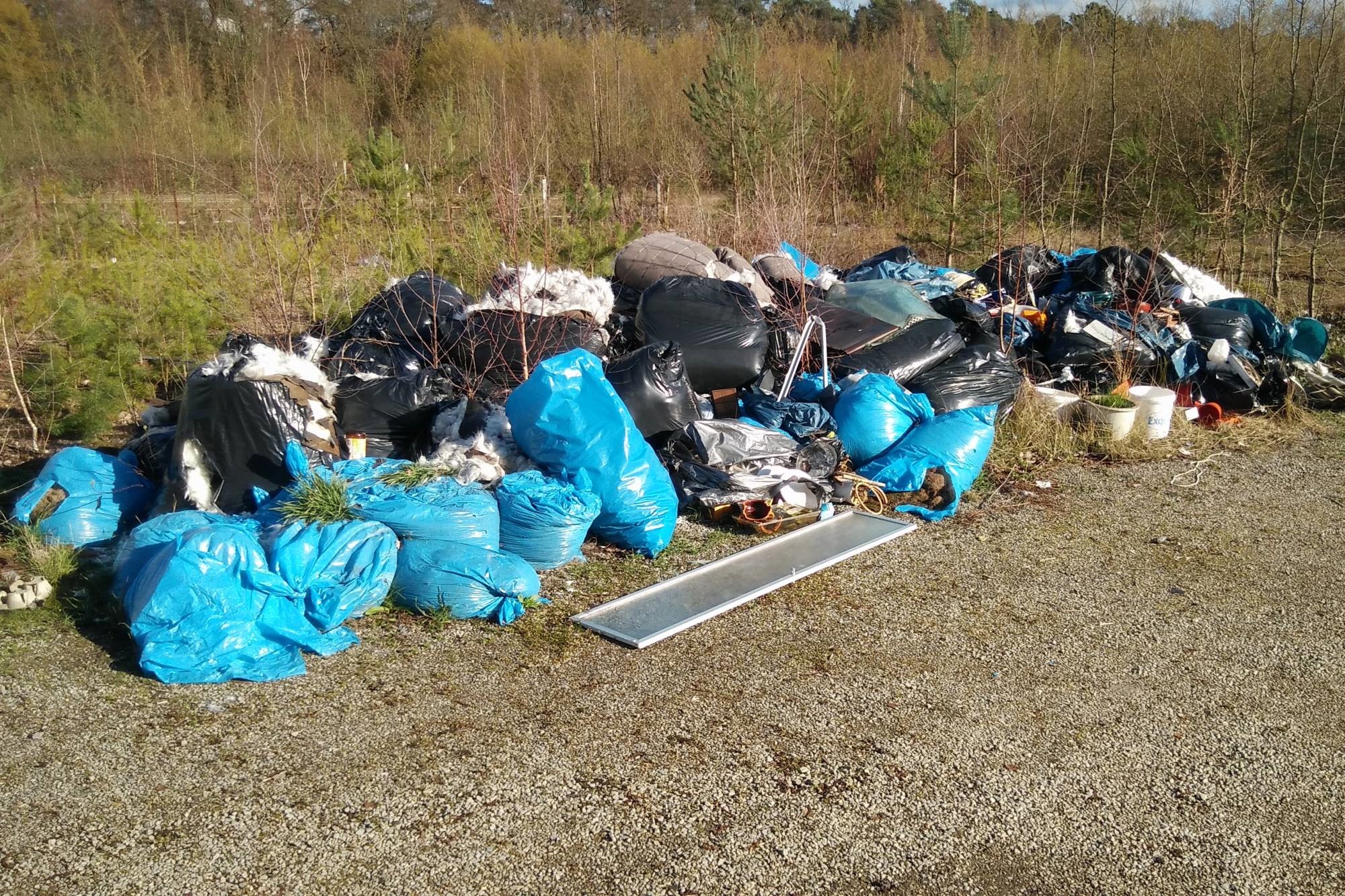Waste
The Lower Waste Authority of the City of Wolfsburg is responsible for the entire area of waste monitoring and the processing of violations of the Waste Act, for example illegal waste dumping, so-called "wild waste". This is based in particular on the Federal Closed Substance Cycle and Waste Management Act (KrwG) and the Lower Saxony Waste Act (NAbfG).
We will be happy to provide you with information on topics such as
- Illegally disposed waste
- End-of-life vehicles/wrecked cars
- Obligation to offer reusable waste

-
Illegal waste dumping (Wild garbage)
Waste may only be deposited in authorized facilities. Dumping waste in the countryside constitutes an administrative offense. Fines of several hundred euros are quickly imposed even for normal household waste. If it is hazardous waste (e.g. used oil), it may also constitute a criminal offense.
You are welcome to report litter by e-mail to abfallbehoerde@stadt.wolfsburg.de. The following information is helpful for efficient processing:
- Where exactly is the waste located?
- What type and quantity of waste is involved?
- Can a person responsible be named?
- How can we contact you if we have any queries?
You can also report littering via the litter report under My Wolfsburg - Litter report.
-
Old cars (car wrecks)
In cooperation with the Wolfsburg-Helmstedt police department, the Lower Waste Authority of the City of Wolfsburg is also responsible for monitoring possible illegal car wrecks on private property and in public traffic areas.
You are welcome to report car wrecks by e-mail to abfallbehoerde@stadt.wolfsburg.de with the following information if possible:
- Where is the end-of-life vehicle located?
- How long has the scrap car been at the location?
- Are there any clues about the owner/keeper?
Please send a photo of the scrap car as an attachment.
-
Used clothing containers and scrap metal collections
Notification of commercial/charitable collections in accordance with Section 18 KrWG
Collections of waste from private households must be notified. This applies to both commercial and non-profit collectors. Common examples are the collection of old clothes or scrap metal.
The notification must be received at least three months before the intended start of the collection. The permissibility of commercial collections depends on whether the public waste disposal authority identifies any overriding public interests to the contrary.
Charitable collections include many charitable associations, but also school or fire department support associations.
The examination of the notification in accordance with Section 18 Paragraph 1 KrWG is subject to a fee for commercial collectors. The fee is charged according to the time spent, but does not exceed EUR 3,500.
Overview of used clothing containers
An overview of the locations of all used clothing containers in Wolfsburg can be found here.
Scrap metal collections
Time and again, Wolfsburg letterboxes contain flyers from dubious waste collectors. The flyers do not contain any contact details and call for a wide variety of household waste to be provided at very short notice. In most cases, illegal collections are announced, for example of old electrical appliances or problematic waste such as car batteries.
The law clearly stipulates that these items must be disposed of exclusively via the relevant public waste disposal authorities or by taking them back from retailers. For this purpose, Wolfsburg's waste management and street cleaning service (WAS) provides convenient collection systems for large and small appliances, which every fee-payer in Wolfsburg finances via their monthly waste fees. More details can be found in the current waste disposal planner and on the WAS website.
In the course of illegal collection, however, it happens again and again that appliances are taken away and cannibalized. The unusable waste is often disposed of in fields, forests and meadows. In less serious cases, this constitutes an administrative offense and, in the case of acute environmental hazards , a criminal offense .
However, the use of illegal collection can also be expensive for the user, as the waste producer is ultimately responsible for proper disposal. For Wolfsburg residents, this means that simply putting out items as part of an illegal collection is an administrative offense that can be punished with a fine of up to 10,000 euros.
If you are not sure whether you are dealing with a legal collector or have observed a suspicious collection, please contact us by email at abfallbehoerde@stadt.wolfsburg.de.
-
Asbestos
Information on the disposal of asbestos for private individuals can be found on the relevant WAS page.
Improper handling of asbestos can be reported informally to the Environmental Agency of the City of Wolfsburg. At weekends, you can inform the police in the event of improper handling of asbestos.
Information about asbestos:
Asbestos refers to a group of naturally occurring mineral fibers, of which the very fine fibers in particular are highly carcinogenic when inhaled. Asbestos is very heat-resistant, insensitive to chemicals and insulates well. When the health risks were not yet known, it was used for heat, fire and sound insulation. Products containing asbestos may no longer be used in Germany. One problem, however, is the disposal of existing old appliances and building materials containing asbestos.
There are two groups of products containing asbestos:
- Solid asbestos was used until 1990 in asbestos cement and other hard asbestos products, such as: Corrugated sheets, façade and balcony cladding, plastic sealing materials, window sills and flower boxes.
- Weakly bound asbestos was used as sprayed and soft asbestos until around 1979 in ceiling and wall coatings, panels for fire, moisture, heat and noise protection, for sheathing water pipes and boiler systems, but also as asbestos cardboard and paper in electrical appliances (e.g. night storage heaters, boiler systems). asbestos cardboard and paper in electrical appliances (e.g. night storage heaters, heaters, toasters, hair dryers, irons), asbestos textiles (e.g. old ironing board covers, fire blankets, sealing cords) or as the underside and carpet pad of floor coverings.
A health hazard arises from asbestos dust released during processing, mechanical stress, weathering or demolition of products containing asbestos, but also during repair and maintenance work on electrical appliances containing asbestos. In many cases, the construction documents, the intended use, the year of construction or the type of appliance can provide indications of asbestos.
In particular, asbestos dust is easily released during removal and conversion work if materials containing asbestos are damaged or torn out. If asbestos is suspected, you should first try to find out from the manufacturer whether a product contains asbestos at all. If necessary, a material sample should be examined by a specialist company.
Handling asbestos requires extensive protective measures. Remediation should therefore always be carried out by a specialist company and not privately.
-
Reusable supply obligation
Following an amendment to the Packaging Act on January 1, 2023, catering establishments that sell food and drinks for takeaway consumption are obliged to offer these in reusable packaging in addition to the previously standard disposable plastic packaging. The aim of the new law is to reduce the amount of packaging waste in the to-go business and thus protect the environment.
Businesses are obliged to inform their customers of the reusable alternative or to fill their own containers. The reusable alternative may not be more expensive than the product in disposable packaging. A deposit can be charged, which is refunded on return.
There are exemptions for small businesses with an area of up to 80 m² and fewer than five employees. However, they must allow their customers to fill their own containers.
You are welcome to report possible violations by email to abfallbehoerde@stadt.wolfsburg.de.
-
Other fields of activity
The Lower Waste Authority is also the point of contact for
- the approval of the temporary storage and treatment of waste (e.g. building rubble), unless the State Trade Supervisory Office is responsible
- monitoring the disposal of waste by third parties, unless the State Trade Supervisory Office is responsible
- monitoring hazardous waste at facilities that are not part of the manufacturing industry, e.g. retail, medical practices, trades. However, the Braunschweig State Trade Inspectorate is responsible for monitoring hazardous waste from the manufacturing sector and industry.
- the Packaging Act (e.g. deposit collection and return for drinks packaging)
- the Waste Oil Ordinance (AltölV) and
- the Battery Act (BattG)
-
Waste disposal/waste consulting
If you have specific questions about the disposal of special waste such as bulky waste, building rubble, asbestos and so on, please contact the waste advisory service of Wolfsburg Waste Management and Street Cleaning (WAS).
You can also find out more with the help of the Waste ABCs.
- Register and re-register garbage cans, register bulky waste, yellow bag, waste ABC
-
Contact
City of Wolfsburg Mona Markgraf Environmental and Climate Protection Head of Department Lower waste authority Telephone: 05361 28-1960 Mr. Klass Town Hall B, Room B 443 Randolf Fiebich Telephone: 05361 28-2069 Deputy Head of Department abfallbehoerde@stadt.wolfsburg.de Phone: 05361 28-1686 City of Wolfsburg
Environmental and climate protection
Lower waste authority
Ms. Lange
Town Hall B, Room B 433
Telephone: 05361 28-2923
abfallbehoerde@stadt.wolfsburg.de
